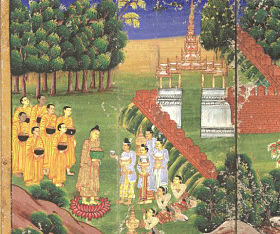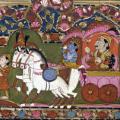15. Mostly Harmless: Non-Violence
Vegetarianism and non-violence (ahimsa) in ancient Jainism, Buddhism, and Hinduism.
Themes:
• L. Alsdorf, Beiträge zur Geschichte von Vegetarismus und Rinderverehrung in Indien (Wiesbaden: 1962). See also L. Alsdorf, The History of Vegetarianism and Cow-veneration in India (Abingdon: 2010).
• C. Chapple, Nonviolence to Animals, Earth, and Self in Asian Traditions (Albany: 1993).
• P. Dundas, The Jains (London: 2002).
• J.R. Hinnells and R. King (eds), Religion and Violence in South Asia: Theory and Practice (London: 2007).
• J.E.M. Houben and K.R. van Kooij (eds), Violence Denied: Violence, Non-Violence and the Rationalization of Violence in South Asian Cultural History (Leiden: 1999).
• P.S. Jaini, The Jaina Path of Purification (New Delhi: 1998).
• L. Schmithausen, “A Note on the Origin of Ahiṃsā,” in R. Tsuchida and A. Wezler (eds), Harānandalaharī: Volume in Honour of Professor Minoru Hara on his Seventieth Birthday (Reinbek: 2000), 253-82.
• T. Sethia (ed.), Ahiṃsā, Anekānta and Jainism (Delhi: 2004).
• U. Tähtinen, Ahiṃsā: Non-Violence in Indian Tradition (London: 1976).
Thanks to Shalini Sinha and Peter Flugel for advice on this episode!

Origins


 ..
..



Comments
Vegetarianism/Non-violence
I enjoyed the podcast on non-violence very much and was wondering if you had determined that vegetarianism is the right path for you.
In reply to Vegetarianism/Non-violence by Noctura
Vegetarianism
Well, yes and no: I am not a vegetarian, but I think I probably should be. The only argument I can think of that would justify meat eating is that the animals who are consumed would otherwise not exist at all (few would go to the trouble of raising livestock just to watch them roam around without serving any economic use). So on utilitarian grounds it seems to me that one could argue that animals raised with good welfare guidelines and thus have pleasant lives, and who are then killed with little suffering on their part, could legitimately be eaten since it is the only reason the animals got to be alive in the first place. But this point is subject to several counter-arguments, e.g. that it is wrong to use sentient life forms as ends to our own pleasure or desire-satisfaction (of course that response suggests that one should be vegan, not just vegetarian). Plus it is hard to verify whether the animals were in fact raised in pleasant circumstances.
It's obviously a much-debated subject, though, and for the purposes of the podcast we just wanted to contextualize the ancient Indian views, which seem to emerge from rather different considerations that are far less utilitarian. By the way you might also want to check out episode 92 which talks about Porphyry's arguments against eating meat.
In reply to Vegetarianism by Peter Adamson
Vegetarianism
Hi, I have made the exact same point time and again when arguing with friends who have tried to 'convert' me to vegetarianism: The livestock just wouldn't exist otherwise, and it is far from clear that non-existing is a better situation than existing for those animals. It is a weird question, but I would argue that probably it is better for the animals to exist, mostly just because I struggle to see how deciding to make a species non-existent is a more 'ethical' option. In this direction I had 2 questions:
1. Has someone already made this argument in the ethical literature?
2. What do you think Buddhism or other traditions that view life as suffering would actually say on the above question? Would they not actually argue that it is better for animals to not exist?
Thank you for once again a great episode!
In reply to Vegetarianism by Peter Adamson
Well, but if ahimsa can and
Well, but if ahimsa can and maybe should be extended to plants, then you will get into deep trouble. If one can argue that it is wrong to use sentient life forms as ends to our own pleasure or desire-satisfaction, then one can similarly argue that it is wrong to use life forms in general as ends to our own pleasure or desire-satisfaction, just as some Jaina argue, if I got that right. Apparently being a heterotrophic life-form, that is being dependent on other life-forms for nutrition, is problematic.
I personally think, though, that ought needs to imply can. Heterotrophic life-forms therefore never ought to be autotrophic, as it is impossible for them to be such. It's impossible to lead a life of non-violence to other life-forms as human, as it'd prevent oneself from living.
Getting back to the distinction of sentient versus non-sentient life forms, one can live without harming sentient life-forms. But one could equally live without harming non-sentient life-forms. Which way around one is doing it seems inconsequential in so far as one is avoiding the consumption of one to the detriment of the other. Then, something has to be in being "sentient" that makes this differentiation one that justifies the treatment of one as an end not only for own pleasure or desire-satisfaction, but also for the continuation of pleasure and desire-satisfaction of other senitents. And then there's the problem of where sentience begins!
As I understood the concept of ahimsa, I think if you can justify eating plants, then you can justify eating meat.
In reply to Well, but if ahimsa can and by Peter
Vegetarianism
Thanks to both of you for your comments. Regarding Diana's question, I'm reluctant to speak for Buddhists - but what I took from the classical tradition at least was that both the Buddhists and Jainas weren't actually so focused on what is better for the animal (e.g. to exist or not), but rather what is good for the human as an ethical agent. The question of weighing the benefit of different scenarios for the animal is more relevant to contemporary utilitarian approaches to vegetarianism, and here the key author has been Peter Singer (an easy way to start getting into him is to listen to the Philosophy Bites interview he did). Of course in an ancient Indian perspective you also have to factor in reincarnation, and the prospect that a slain animal may even come back as a higher life form so that you would be "doing them a favor" by killing them. That's an argument I have seen in Islamic philosophical texts actually.
Re. Peter's point, notice that the Jaina renouncer's solution actually does allow him to avoid harming plants, since he eats only what the layperson provides him, so he in effect outsources the harming to someone else. Again, that seems pointless from a utilitarian perspective but that was not the way they were thinking about it. So by their standards at least it is not impossible to continue living while adhering to strict ahimsa.
By the way something I perhaps didn't get across in the podcast is that while the Jainas think harming plants is bad and harming animals is bad, it's vastly worse to harm a sentient being than to harm a plant. So you would have a good reason as a Jaina to be a vegetarian even if you reconciled yourself to causing some unavoidable degree of harm.
In reply to Well, but if ahimsa can and by Peter
eating plants
Peter ("Well, but if ahimsa can…"), I have heard your last comment (if you can justify eating plants, then you can justify eating meat) many times, but I am not sure it makes sense. First of all, I cannot remember which source describes some Manicheans as eating only fruits fallen from the trees and eggs abandoned by hens (they always produce eggs, and only care for the ones which are fecundated). Thus, eating without violence seems at least possible also without recurring to the solution suggested by Peter Adamson (living on alms). Second, you are right that ad impossibilia nemo tenetur, but the point is just how low or high you set the bar. It is probably impossible to avoid harming all bacteria, but we can avoid burning ants for fun, eating lambs for pleasure and wearing furs. This means that one can either remain as radical as a Jain and filter water and clean the ground before sitting to avoid harming small insects, or be ready to compromise but still try to do *as less harm as possible*. Tibetan Buddhists typically try to kill as less lives as possible (they would thus prefer killing a single yak, so that many people can it of it, rather than having a single person eat 30 small fish). Jain lay people focus on eating less conscious and less vital things (plants rather than animals and among plants leaves rather than seeds and so on).
In reply to eating plants by elisa freschi
More on non-violence
Thanks for those points Elisa - both well taken .The idea of fruitarianism is indeed to avoid ALL harm, even indirect, while seeking sustenance. But as far as I know (you'd know better) this didn't feature in ancient Indian conceptions of non-violence? I know a text from the Islamic tradition which describes fruitarianism, it appears in Ibn Tufayl's "Hayy ibn Yaqzan" (I mention this aspect of the text in episode 148, I think).
And also I really should have made the point, in the episode, that not all violence is thought to be on a par - the Jains think it is less bad to kill a plant or a mite than a higher animal, as you point out at the end of your comment. So this can go into your calculations about how to minimizing, if not absolutely avoiding, harm.
Thanks for all the fish...
and the "Hitchhiker's" reference.
Speaking of modern references, the discussion of animal sacrifices was very resonant with the work of René Girard and the societal control of violence. It would be an interesting reference connexion when you eventually get to his work.
What is also interesting is the parallels between the Jains and Gnostic dualists such as the Manichaeans and Cathars. These sects had an ascetic clergy - the Perfecti - who had extreme practices. The laity, on the other hand, had relatively lax lives and were renown for indulging in non-productive sexual activities.
What is most striking is the similarity of the Jain's final fast to the Cathar's Consolamentum, in which the Cathar ascethic or layperson essentially starves themselves to death.
I would also suggest another reference for further reading - William Dalrymple "Nine Lives: In search of the sacred in Modern India" which provides an fascinating and sympathetic account of a Jain nun.
Animal Sentience
http://animalstudiesrepository.org/animsent/
peer reviewed resources regarding the emerging field of research into the sentience of nonhuman persons
Animal Sentience: An Interdisciplinary Journal on Animal Feeling
" As an interdisciplinary journal, ASent will be of interest to all who are concerned with the current empirical findings on what, when and how nonhuman animals feel, along with the practical, methodological, legal, ethical, sociological, theological and philosophical implications of the findings. "
http://animalstudiesrepository.org/
of particular note ~ on the other-minds problem
http://animalstudiesrepository.org/animsent/vol1/iss1/1/
empathy & enlightenment
[ Plotinus has been patient ... ]
Gen Z Jaina [ ethical vegan since age 11 ]
in regards to ones
in regards to ones relationship with plants ( self generating non-finite form/structure), I find veganic gardening and veganic forestry to be in alignment with the cosmos and the ethics of holistic nonviolence and reverence for all life. also, an interdisciplinary approach to shifting ones paradigm that integrates molecular cell biology as well may be helpful.
Add new comment